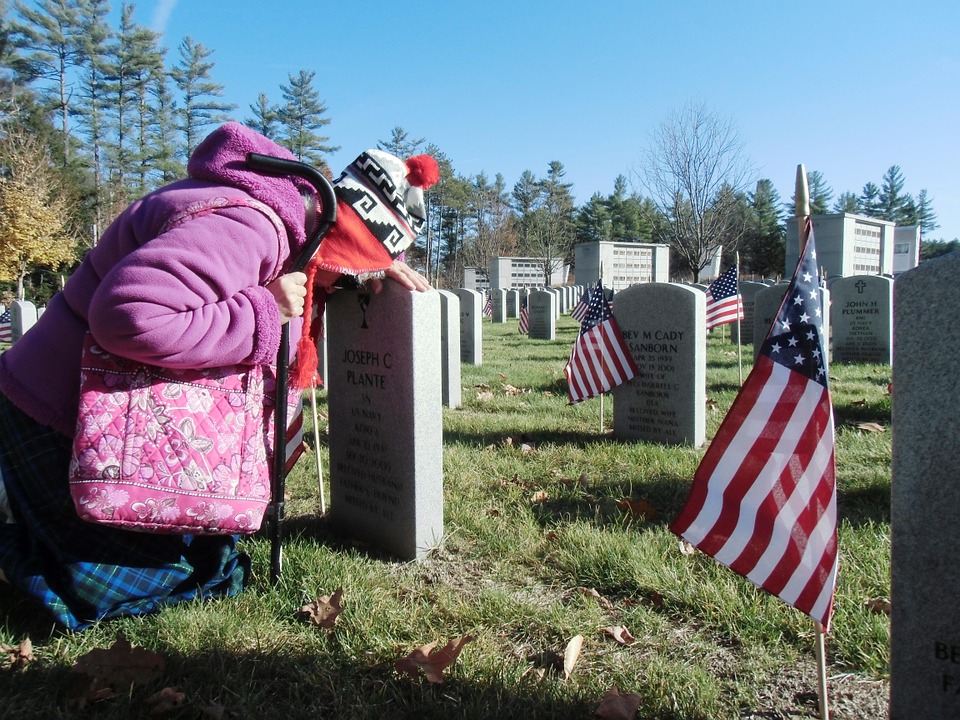As the spouse or dependent of a military servicemember or veteran, you may be aware that you are eligible for a wide variety of benefits designed to help ease the financial burdens of military families. These expenses include health care costs, life insurance, higher education, and more. If you’re the surviving spouse or dependent child of a military servicemember, you may be eligible for additional benefits from the VA that can help meet both long-term financial needs and the short-term costs associated with laying a loved one to rest.
8 Important VA Survivor Benefits
- Financial compensation
- Health care
- VA survivors pension
- Life insurance
- Home loans
- Grief counseling
- Education
- Burial Services
Survivor benefits from the U.S. Department of Veterans Affairs are designed to compensate survivors of military members who either are killed in the line of duty or who die as the result of a service-related disability. In some cases, survivors also receive benefits when a military member dies from a cause unrelated to service, but had previously been rated by the VA as completely disabled from a service-related disability for a set amount of time immediately preceding death.
Who Qualifies for VA Survivor Benefits?
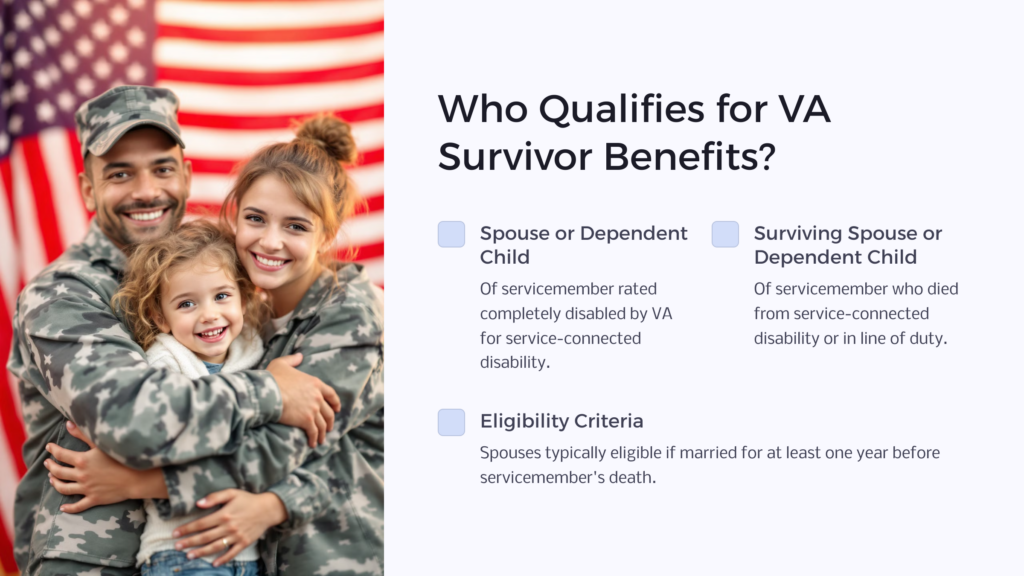
Those who are eligible for VA survivor benefits typically comprise spouses and dependents, though in some cases, the parent(s) of a deceased servicemember also may be eligible.
In most cases, survivors must meet one of the following eligibility criteria:
- Be the spouse or dependent child of a servicemember who has been rated completely and permanently disabled by the VA for a service-connected veterans disability
- Be the surviving spouse or dependent child of a servicemember who died from a service-connected disability, as validated by a VA disability rating
- Be the surviving spouse or dependent child of a servicemember who was rated completely and permanently disabled by the VA at the time of death from a service-connected disability
- Be the surviving spouse or dependent child of a servicemember who died in the line of duty
Spouses typically are eligible for most VA survivor benefits if they were married to the servicemember for at least one year immediately prior to the servicemember’s death and as long as they remain unmarried. If you think you might be eligible for VA survivor benefits, you can either apply by mail or you can visit your local VA office and apply for benefits in person.
8 Important VA Survivor Benefits
There are many different benefits you may qualify for from the VA as a VA survivor – we’ve listed several below.
Financial Compensation
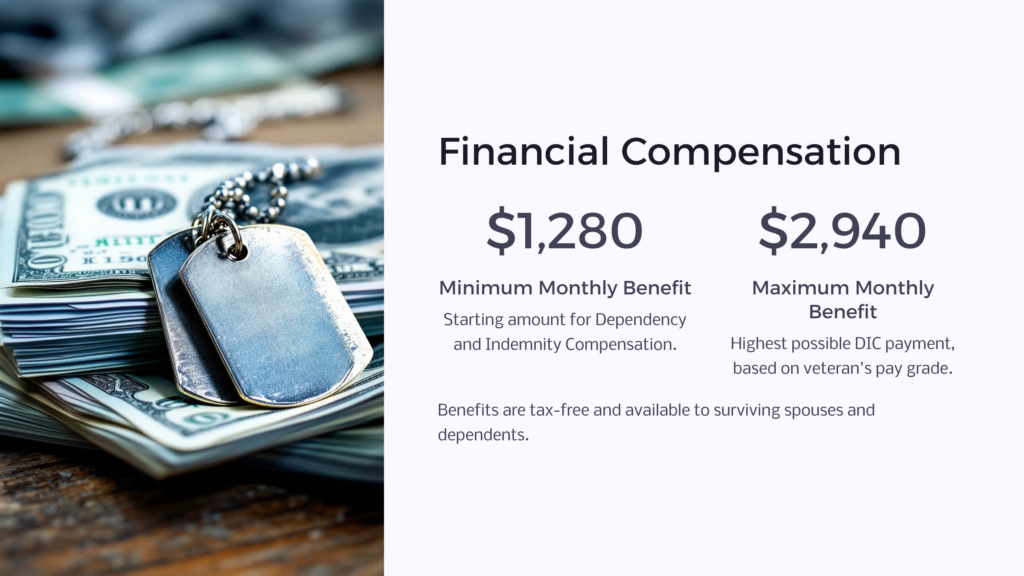
If you are the surviving spouse or dependent child of a U.S. veteran, you may be eligible for VA survivors benefits, which would pay you a consistent monthly amount of income. You should research whether you’re eligible for Dependency and Indemnity Compensation. This tremendous benefit could mean you qualify to receive tens of thousands of dollars every year in tax-free payments if you qualify.
This program is designed to pay lifetime benefits to VA survivors ranging anywhere from $1280 to $2940 per month. The amount of benefits is directly tied to the veteran’s pay grade at the time of death, and benefits are possible for both surviving spouses and surviving dependents. In some cases, surviving parents of veterans may also be eligible for survivors benefits if they meet low-income qualifications.
Generally, to be eligible for DIC benefit, a surviving spouse or dependent child must show the following:
- That the servicemember died while on active duty, active duty training, or inactive duty training
- That the servicemember died of a service-related condition
- That the servicemember died of a cause unrelated to service, but previously had been rated by the VA as completely disabled
Health Care
Through the Civilian Health and Medical Program, or CHAMPVA, of the Department of Veterans Affairs, eligible survivors also can receive health care coverage. Under CHAMPVA, the VA takes on a portion of health care expenses associated with medical supplies and services it deems necessary for survivors. This includes both surviving spouses and children. Typically, eligibility for CHAMPVA is tied to a military member’s service-connected VA disability rating. The VA also offers other health coverage programs specifically targeted to particular health conditions or other narrow circumstances.
VA Survivors Pension
For survivors of military members who served during wartime, the Survivors Pension or Death Pension allows for tax-free monthly benefit payments if the spouse has not remarried. Surviving spouses do need to meet income eligibility criteria to qualify, and benefits also are available for unmarried dependent children. The specific amount of benefit payments is set by Congress each year, and also factors in survivors’ countable income, net worth, and expenses. Sometimes, certain expenses like health care count toward reducing countable income. The current maximum annual pension for eligible survivors rounds out at about $9,000.
To meet eligibility for a VA survivors pension, a spouse or dependent child must meet the following: the servicemember did not receive a dishonorable discharge; and the servicemember meets one of the following eligibility requirements:
- The servicemember entered active service on or before Sept. 7, 1980, and completed at least 90 days of military service, at least one of which was during wartime
- The servicemember entered active service after Sept. 7, 1980, and served at least 24 months, with at least one day being during wartime
- The servicemember was an officer and began service after Oct. 16, 1981, without serving on active duty for at least 24 months
The survivor also must meet the income and net worth limits established by Congress. The surviving child of a deceased member of the armed forces during wartime also may be eligible for the VA survivors pension if she meets one of the following criteria:
- Younger than 18 years old
- Younger than 23 years old and attending a VA-approved school
- Unable to care for daily needs because of a disability that occurred before age 18
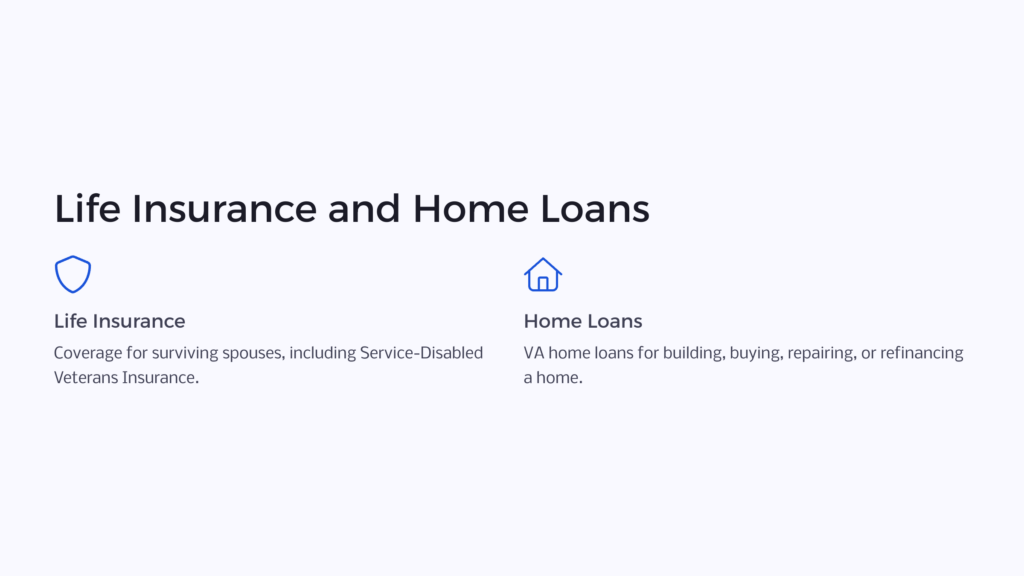
Life Insurance
The VA offers life insurance coverage for surviving spouses. The VA can also help you if you are a surviving spouse named as a beneficiary of a veteran’s existing life insurance policy. Disabled military veterans with service-related disabilities are eligible for a Service-Disabled Veterans Insurance policy, which can provide up to $10,000 in compensation for any eligible survivors. Some totally disabled veterans also have the option to apply for an additional $30,000 in life insurance coverage.
It’s important to note that the VA also offers voluntary life insurance programs like the Veterans Group Life Insurance and Service Members Group Life Insurance. These are completely optional programs, so survivors are not guaranteed any life insurance benefits unless the servicemember was enrolled in one of these programs.
Home Loans
 For surviving spouses, you may qualify for VA home loans that can help you build, buy, repair, or refinance a home. The unmarried surviving spouse of a servicemember who died while in service or because of a service-related condition will be eligible for a new VA loan. Spouses who entered into a VA loan with the military spouse also are eligible for a VA-guaranteed interest rate reduction refinance loan, no matter the servicemember’s cause of death.
For surviving spouses, you may qualify for VA home loans that can help you build, buy, repair, or refinance a home. The unmarried surviving spouse of a servicemember who died while in service or because of a service-related condition will be eligible for a new VA loan. Spouses who entered into a VA loan with the military spouse also are eligible for a VA-guaranteed interest rate reduction refinance loan, no matter the servicemember’s cause of death.
A VA home loan has several advantages over traditional mortgage loans – for starters, VA loans often are available with no down payment. VA loans usually also mean that the homeowner doesn’t have to pay for private mortgage insurance. If a survivor chooses to use a VA loan for refinancing, that means the survivor can get cash for the equity in the home and then use it to cover any necessary medical expenses, pay off debt, make home improvements or renovations, and more.
Grief Counseling
The VA offers bereavement counseling to any survivors, including parents, spouses, and children of servicemembers killed in the line of duty. This also includes survivors of reservists and members of the National Guard who are killed while in service. These services typically are delivered at your local VA Veterans Center.
Education
The VA administers the Survivors’ and Dependents’ Education Assistance Program, which can help cover tuition costs associated with higher education. Sometimes, the GI Bill credits of a deceased servicemember can transfer to a surviving spouse or dependent child. Many resources exist to help survivors of military members to pursue higher education or vocational training and may cover up to 45 months of training or study.
In addition to the DEA program, the VA also offers the Fry Scholarship program, which covers full tuition costs for in-state public institutions or approximately $20,000 toward tuition at a private institution. Named after Marine Gunnery Sergeant John D. Fry, the program also provides a monthly stipend to help cover room and board, books, and other daily living expenses. Both surviving dependents and spouses are eligible for the Fry program, and the guidelines for using the funds are generous. Both programs can be used to support survivors at many kinds of educational institutions – colleges and universities, business technical and vocational programs, apprenticeship programs, tutoring, and even certification tests.
A survivor’s eligibility for these education-related benefits depends largely on the deceased servicemember’s circumstances of death, the age of dependents, and the marital status of the surviving spouse.
Burial Services
The VA can help surviving spouses and dependents with the burial process, especially if the deceased veteran wanted to be buried in a VA national cemetery. The VA allows military veterans to pre-apply for approval for VA national cemetery burial, which can make the burial process much easier and less stressful. Eligible veterans, plus their spouses and dependents, can be buried in one of 136 national cemeteries that the VA maintains across the country.
Comprehensive burial benefits may include both opening and closing of the grave, a government headstone or marker, a Presidential Memorial Certificate, and a burial flag for the family. If a veteran is buried at a private cemetery, the VA may provide a headstone, PMC, and burial flag, and may also help cover some burial-related expenses.
VA Survivor Benefits
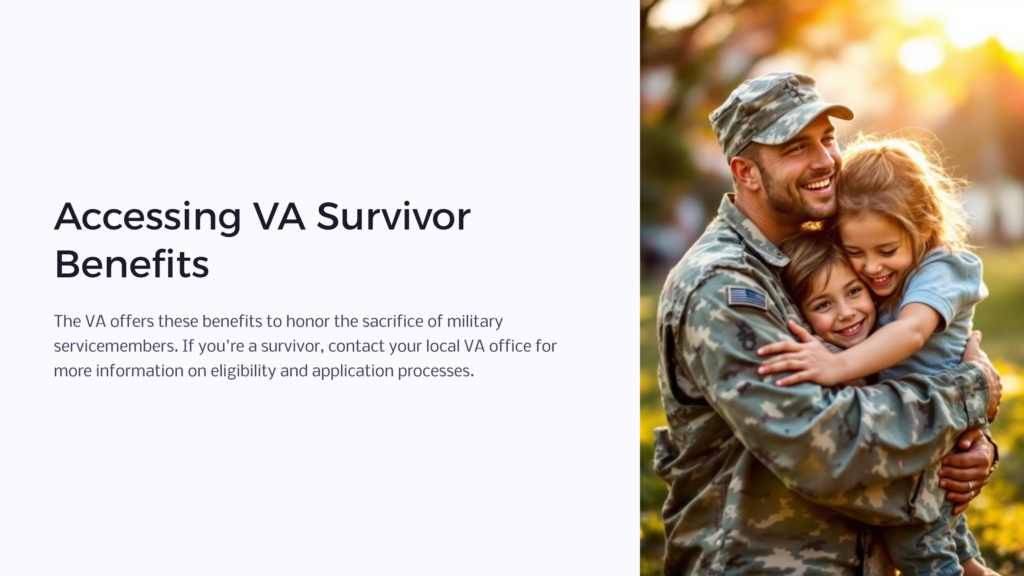
The U.S. Department of Veterans Affairs recognizes that the men and women of the American military are a unique, diverse, and invaluable force all over the world. Making sure that the survivors of those who die during their time of service or from service-related conditions is just one small way the U.S. government pays respect to the sacrifice of these outstanding individuals. If you are the survivor of a military servicemember and think you may be eligible for any of these services, please reach out and contact your local VA office for more information.
 Benefits.com Advisors
Benefits.com Advisors
With expertise spanning local, state, and federal benefit programs, our team is dedicated to guiding individuals towards the perfect program tailored to their unique circumstances.
Rise to the top with Peak Benefits!
Join our Peak Benefits Newsletter for the latest news, resources, and offers on all things government benefits.















